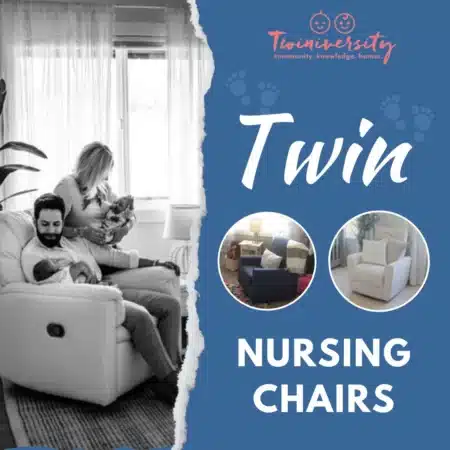Last updated on September 30th, 2021 at 10:14 am
In the last five years, I have mastered terrifying things. I have given birth to preemie twins and along that road, I have been through my hospital’s maternal fetal medicine unit, antepartum, the NICU, the PICU, the ER, and pediatric specialists. I have learned how to hire and trust nannies (and pay nanny taxes); how to ask for help and share my vulnerabilities; and how to take my kids out in public – in fact, I once took my potty-training twin toddlers and their newborn brother to the zoo, by myself!
This is why I know that you – someone who has mounted numerous obstacles in parenting multiples— can overcome the fears that have kept you from thinking about and planning for your death.
I am a lawyer specializing in death planning. The more polite way of saying that is “estate planning” and “probate,” but do not let these legal terms confuse you. When you meet with me or another estate planning attorney, we are there to discuss death. We will talk about what will happen to your home, bank accounts, business interests, and bills upon your death, and more importantly, what will happen to your kids. Then we will help you formulate a death plan and put that plan into a legally-binding document.
But before we talk about what a death plan entails, let me make a case for why your kids need you to make a death plan.
Why You Need a Death Plan
 Our society has tried hard to make laws, build agencies and court systems, and train professionals to help children in all life experiences, including orphans. A parent can be either an active or a passive participant in those systems. If you are a passive participant who fails to make a death plan and your children are left without any living parents, a social worker and judge will make recommendations and decisions as to the best environment and guardian for your orphaned kids. You will not be alive to share your thoughts and concerns with the court, so without a legally-recognized death plan, you will not have a voice in that process.
Our society has tried hard to make laws, build agencies and court systems, and train professionals to help children in all life experiences, including orphans. A parent can be either an active or a passive participant in those systems. If you are a passive participant who fails to make a death plan and your children are left without any living parents, a social worker and judge will make recommendations and decisions as to the best environment and guardian for your orphaned kids. You will not be alive to share your thoughts and concerns with the court, so without a legally-recognized death plan, you will not have a voice in that process.
As a parent in the grind of raising multiples myself, I believe that no one understands the best interests of your child as well as you. Throughout their lives, you have played an active parenting role—you have fed them, cried with them, and supported them. You have actively participated in your children’s medical treatment plans and individual education plans (IEPs). I am simply proposing a way for you to be active in their fates, even upon your death. Though you will not be there to see your plan implemented, your death plan is an active way for you to direct those agencies and courts towards the best interests of your children, in the toughest moments of their lives.
Every parent should have a death plan, but there are some families who are more vulnerable within our systems. Here are a few special considerations:
(1) Courts often give a preference to the child’s relatives. If a friend, neighbor, or other relation is a more appropriate guardian for your children, your death plan is your opportunity to draw the court’s attention to that fact.
(2) Feuding relatives? Court proceedings following a loved one’s death often bring out the worst in people. Consider how your children would cope if both your sister and your mother-in-law applied to the court for guardianship and proceeded to have a court fight pointing out the other relative’s personal failings.
Who Should I Appoint as My Children’s Guardian?
 For some of you, you and your significant other have always known who is the person best suited to raise your kids in your absence. But I have found that, for parents of multiples or of children with special needs, the decision can be more difficult, even paralyzing.
For some of you, you and your significant other have always known who is the person best suited to raise your kids in your absence. But I have found that, for parents of multiples or of children with special needs, the decision can be more difficult, even paralyzing.
There is no one who can replace a parent. There is no one who can heal a broken heart quite like you and no one who can advocate so well for your multiples. So what qualities should you consider when appointing the person who will fill that role in your absence? After struggling with this issue personally and assisting others professionally, I have formulated a simplified list of considerations.
(1) Is this a trustworthy person?
(2) Does or will this person love my children?
(3) Can this person provide a safe environment for my kids?
(4) Would this person commit long term and unconditionally to assist my children in becoming caring and independent adults?
If you have the luxury of multiple people in your life who meet these criteria, then feel free to consider parenting styles, cultural traditions, location, and other items.
What Kind of Legal Document Do I Need to Execute?
 The legal document for naming a guardian for your children is controlled by state law. That means that a Florida resident will execute one type of document, while a Connecticut resident may need something different. Generally, a last will and testament is an appropriate document for naming a guardian for minors, but even those documents will vary by state. A last will and testament generally must be in writing and executed according to the laws of your state—probably signed at the end of the document with a specified number of witnesses and possibly a notary. (Note: a last will and testament is different from a living will, health care power of attorney, or health care advocate form.)
The legal document for naming a guardian for your children is controlled by state law. That means that a Florida resident will execute one type of document, while a Connecticut resident may need something different. Generally, a last will and testament is an appropriate document for naming a guardian for minors, but even those documents will vary by state. A last will and testament generally must be in writing and executed according to the laws of your state—probably signed at the end of the document with a specified number of witnesses and possibly a notary. (Note: a last will and testament is different from a living will, health care power of attorney, or health care advocate form.)
For those families who are able to provide financially for their children upon a parent’s death, you should discuss with your advisor how those assets should be titled and when your children should have access to the financial resources. Ask your attorney and financial advisor whether a trust is appropriate and what type of trust will suit your needs.
How Do I Get These Documents?
A last will and testament is a legal document that will be enforced by the court system. The person drafting your documents should be knowledgeable about the law and courts. I recommend contacting an experienced estate planning attorney licensed in your state. If you do not know a lawyer, contact your state or local bar association for a referral.
Note: This article does not constitute individualized legal advice. You should seek individualized legal advice from an appropriately-licensed professional before formulating a death plan.
 Sarah J. Corney has been married to Christopher for nearly 9 years and is the mother of identical 4-year-old twins, Andrea and Addison, and 2-year-old Calvin. Sarah is an attorney with the law firm of Robison, Curphey & O’Connell, with offices throughout Northwest Ohio. She is licensed to practice law in the states of Ohio and Florida, with a focus on estate planning, and a passion for working with young families, especially those of children with special needs. In her spare time, she enjoys hiking and neighborhood fun. For more information about Sarah’s services and experience, check out her biographies here and here.
Sarah J. Corney has been married to Christopher for nearly 9 years and is the mother of identical 4-year-old twins, Andrea and Addison, and 2-year-old Calvin. Sarah is an attorney with the law firm of Robison, Curphey & O’Connell, with offices throughout Northwest Ohio. She is licensed to practice law in the states of Ohio and Florida, with a focus on estate planning, and a passion for working with young families, especially those of children with special needs. In her spare time, she enjoys hiking and neighborhood fun. For more information about Sarah’s services and experience, check out her biographies here and here.







